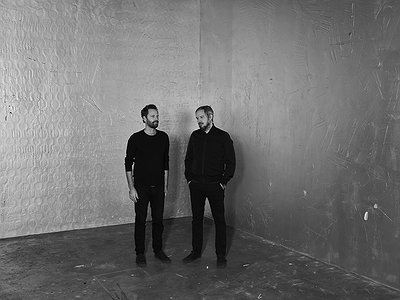Could you describe your creative process on the basis of a piece or album that's particularly dear to you, please? Where did the ideas come from, how were they transformed in your mind, what did you start with and how do you refine these beginnings into the finished work of art?
One of my favourite pieces from AWVFTS first album entitled “Steep Hills of Vicodin Tears” was always a really interesting process. Adam initially sent me these really beautiful sound swells to work with. I decided to start with a kind of graphic score that I made, based on the idea of moving up a hill and as it gets steeper it also becomes more and more beautiful. With this, we started creating the string parts and other sounds and when we finally recorded the strings in the old FUNK HAUS recording studios in Berlin, it brought another layer to the music. It’s still one of my favourite string sounds I’ve recorded, and I think this had a big effect on the emotional part of this piece.
There are many descriptions of the ideal state of mind for being creative. What is it like for you? What supports this ideal state of mind and what are distractions? Are there strategies to enter into this state more easily?
Being in a place where you have time and space and can feel relaxe and is sound-proof is ideal. Feeling free to try ideas without judgement is really important to finding your own sound. Phones and computers are a distraction for sure and I remember a time when this was not really an issue. But I’m trying to be aware of it now because I think if we are constantly distracted, we’ll never get to the deeper stuff.
How is playing live and writing music in the studio connected? What do you achieve and draw from each experience personally? How do you see the relationship between improvisation and composition in this regard?
Most compositions are born from spending time in the studio improvising and recording… and then slowly carving out something that will remain. When it’s time to create a live version it usually evolves again with the players we are working with. But in general, I love a composed piece. We take a lot of time to craft out small details and it’s great to achieve these live as well. Then there are those beautiful moments when everyone is playing off each other and there is an energy in the crowd; things that can only happen when you perform live.
How do you see the relationship between the 'sound' aspects of music and the 'composition' aspects? How do you work with sound and timbre to meet certain production ideas and in which way can certain sounds already take on compositional qualities?
The way a piece is recorded has a huge effect on how it translates emotionally. The same piano piece recorded on a beautiful Steinway in a perfect studio will transmit something completely different to the same piece recorded in a small room on an old upright. I learned early on that how you record something will affect how the music is perceived.
I’m always aware of the sound I’m recording and how I approach it according to the music. It’s such a big part of the experience. One of my all-time favourite recordings was done with one mono microphone. There is a sense of time and nostalgia in recordings from different times and this adds a whole other layer to the music.
Our sense of hearing shares intriguing connections to other senses. From your experience, what are some of the most inspiring overlaps between different senses - and what do they tell us about the way our senses work? What happens to sound at its outermost borders?
I’ve always experienced music as a form of synaesthesia, seeing color and music connected. So, in a way, when I’m making music, I’m also searching for the right colors, ones that are most pleasing to me. Lately I’ve been fascinated with ASMR and how certain sounds can really have an effect on the listening experience, and I think in a way I’m always searching for sounds that have this pleasing effect on my brain.
Art can be a purpose in its own right, but it can also directly feed back into everyday life, take on a social and political role and lead to more engagement. Can you describe your approach to art and being an artist?
As much as I think it’s important that art engages our social and political environments, I prefer to focus more on something more timeless. The world will always need the poetry of art; it’s what gives us hope and I prefer to focus on that. I will always seek out transcendence in art; something bigger than the human experience.
It is remarkable, in a way, that we have arrived in the 21st century with the basic concept of music still intact. Do you have a vision of music, an idea of what music could be beyond its current form?
It seems we have pretty much explored most ideas in music at this point. But I’ve found myself increasingly drawn to sound as a form of music, something that can become almost like a sculpture. There are a few artists exploring this and perhaps it’s something well explored in sound installation. But I find in this age of hyper-communication, we are looking for spaces that give us room to think and co-exist with in the music, and sometimes non-tonal music can create this. Perhaps it will be a more accepted way of listening to music in the future.


